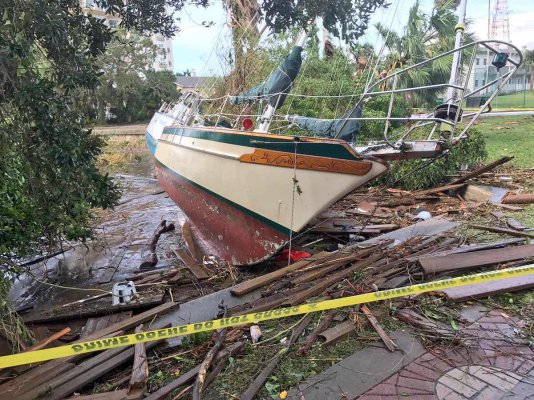Wifey B: I think we learn sometimes. I know South Florida learned about building codes after Andrew. Houses built since then did very well in Dade, Broward and West Palm as did new commercial buildings.
And those wicked evil insurance people help us manage risk when we're too dumb to do so. They don't tell us we must replace windows with hurricane ones or replace roofs to today's code but they tell us windstorm insurance will cost many times more if we don't. And then they and FEMA look at elevation and flood history and tell us what will cost more.

I'm not a mathematician, but in my simple mind it seems like you take record storm surge, 100 year or whatever, and you add a few feet for waves and you make sure you have that elevation. Well, our flood insurance now costs less than our neighbors as we're an 10'+ and the record surge is under 6'.

And marinas. Look at those built since Andrew, look at most Broward Marinas. Oh, science and math. Concrete, no bolts though just decking, floating, and piles higher than the greatest surge.

Now it takes time. We have older homes and some were well built, some not. I see Hemingway's cats all came through fine.

But many of the older homes are built in a way in a place that's not smart.
We're going to get tons of complaints over electric but the changes they made since Andrew have been big time pluses and I'm impressed given the numbers. Now, water systems may be the next big concern. (Sidebar: Omg, our neighbors are going to get would up on underground wiring again. They can't get it because it requires everyone on the line to approve and pay as we don't have an HOA to vote and force everyone. Plus they might be glad they don't have it. Yes, it protects against falling trees and limbs. But it also is much much much much harder to chase down problems and very susceptible to flood issues. Doesn't matter as it's not going to happen in our neighborhood. We'd require everyone on the line to do it and we're the last house. Odds of 350 homeowners all agreeing? Well, again, I'm not the mathematician but I'd say 1 in a bazillion.)
Some of the changes take generations. Some take unpopular moves. I never thought much of houses on the ocean before but now I look at each one thinking

or

. I now think of words like 150 mph winds and elevation and hurricane resistant.
I had to be dragged into the world of LED lights. I liked my old lights. I didn't want to change. But the change was right and if I see one of the old kind now, I think

We're not going to change it all overnight but it will slowly happen. I'm upbeat and



Now, lunch over, and I must get back to work. We're on our way to meet someone in West Palm. Work assignment we were given.




 But many of the older homes are built in a way in a place that's not smart.
But many of the older homes are built in a way in a place that's not smart.  or
or 